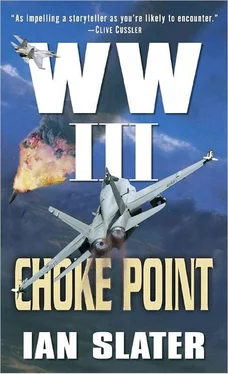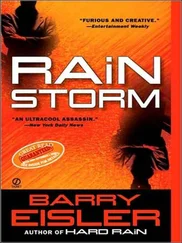In Kazakhstan’s new capital, Astana, 390 miles northwest of China’s invasion — or “policing incursion,” as Beijing preferred to call it — the ruling Communist party boss, a sullen pro-Russian leftover of the Cold War and the Soviet Union’s collapse, did not join the Muslims or the PLA, afraid of the deep and still active Muslim hatred of Russia and the PLA’s institutionalized distrust of Moscow. Besides, the Muslims made up almost half the city’s population, and the most radical elements were known to make common cause with China’s Muslim Urghurs. What the Communist party boss did do, however, was try to contact the elusive Li Kuan. The party boss had connections with old comrades in Russian nuclear facilities who had difficulty making enough money to put bread on the table.
Later that day, in Washington, D.C., the President expressed outrage at the PLA’s violation of Kazakhstan’s territorial integrity and said he had called in the Chinese ambassador. China’s two Group Armies were now fifty miles into the arid steppe of Kazakhstan and kept advancing, albeit slowly, determined to rout every Muslim terrorist out of every crack and cave. The aim was to form a buffer zone between the two countries and secure the vital oil and rail lines between the two from terrorist sabotage, which Beijing said was clearly in both Kazakhstan’s and China’s national interests.
The U.S. State Department and the White House, in rare agreement, were secretly reaching the same conclusion, despite the President’s public expression of dismay. The surge of over a hundred thousand Chinese regulars over the Xinjiang-Kazakhstan border was alarming to some of Foggy Bottom’s experts, but a state of open rebellion in China that could ensue should Beijing fail to go after the terrorists was a much worse scenario. As Eleanor Prenty, National Security Advisor, knew, in every administration — indeed in any government — stability won out against chaos every time.
“If you think Yugoslavia breaking up was complex,” she told the President, “imagine what the disintegration of Xinjiang would be like.” She paused to take out the map of Central Asia she’d had faxed over from State. “There are fourteen national minorities over there,” she continued. “Sooner or later, amid all the Muslim rioting, we’d be caught up in it because of our base at Manas in nearby Kyrgyzstan.”
“But,” said the President, always insistent on playing devil’s advocate in his decision-making, “Muslim rioting might break out across all the Stans because the Chinese have crossed the border.”
“Granted,” conceded Eleanor. “There could be widespread rioting throughout the Stans and the Muslim world in general. But if Beijing fails to act decisively and go in now after the terrorists’ staging areas, it’d be like us sitting still and doing nothing after 9/11. That vital section of rail track destroyed by that terrorist bomb was over two miles long.” Eleanor glanced down at her SATRECON report. “Two point six miles, to be exact. And all in one hit, Mr. President — not sequential explosions. We have our problems with Beijing — the perennial human rights issues, especially in Tibet, versus our pro-China trade lobby, who keep arguing, with some merit, that the best way to improve human rights in China is to trade more with them, engage them economically. Beijing’s been careful not to announce its intention to cross the border because it would have brought out every human rights activist, and no doubt the Europeans, telling us we should step in, through the U.N.”
“And,” put in the Chairman of the Joint Chiefs, Sam Wentworth, “the last thing we want, Mr. President, is a war on more than one front. Afghanistan and Iraq were quite enough for us to handle. It’d be a logistical nightmare, no matter how small the operation. I’m with Eleanor on this one. It’s China’s war on terrorism. And to put it quite bluntly—”
“You ever put it any other way, Sam?” There were smiles from the other armed services chiefs.
“I guess not, Mr. President,” the chairman responded gracefully. “My point is, the PLA’s strike into Kazakhstan takes the heat off us militarily all the way to the southwest in the Hindu Kush and gives the Euros someone other than the U.S. to whine about.”
“Euros? You’re excluding Great Britain, I hope.”
“Of course,” said the chairman, it being a particular point of gratitude in the White House that Britain and most of the British Commonwealth countries, particularly Australia, had stood by America’s side in past crises.
“Well then, we’re agreed,” said the President. “We continue with normal expressions of concern. Beyond that, wait and see.”
“The Russians’ll be pissed,” warned Wentworth. “Former republic and all that.”
The President shrugged. “Do they want to be in NATO or not? Besides, they’re no fonder of terrorists than we are. They don’t like the Chinese, but they want a steady oil flow. Stability.”
“Thank God,” interjected Eleanor Prenty, “we had unofficial warnings about China’s intended move and weren’t taken by surprise.”
The President nodded. “That girl, Riser—”
“Yes, sir, Mandy Riser.”
“This country owes her a lot.”
“Yes,” agreed CIA head John Norris, who was ever ready to protect his agency’s turf in the bureaucratic war spawned by the White House’s push to consolidate intelligence agencies after 9/11 into a new giant Department of Homeland Defense. “But the agency had heard other unofficial signals of the Chinese build-up in the Northwest.”
“I meant,” said the President, “her hearing that this slimebag Li Kuan was working in Kazakhstan. Your agency dropped the ball on that one. Thought he was in some damned cave in Afghanistan?”
“We’re sure he was there, Mr. President. But he got out before we could nail him.”
“Like bin Laden. Well, how’d he get to Kazakhstan so quickly?”
Norris explained that if Li Kuan had gotten to Istanbul or Pakistan, he could have caught a Pakistani Air flight to Astan in a matter of hours.
“Well, whatever, but it was that poor girl who gave us the intel that the bastard was in Kazakhstan. And we know now after the rail line hit that Li Kuan’s clients there have quite a conventional explosives wallop. If he manages to sell them the slag for a dirty nuclear bomb, we’re all in trouble. Let’s hope the Chinese get him.”
“Yessir.”
Norris was tempted to explain that it had been the Chinese General Chang who had actually told Charlie Riser, the U.S. cultural attaché in Beijing, that Li Kuan was reported in Kazakhstan, but he didn’t press the point. It would have seemed too pedantic.
“John,” the President said to Norris, “how are our Chinese surveillance flights going? Any problems?” The President could never bring himself to call the Aries II surveillance flights what they were — U.S. spy missions. One of the Lockheed Martin Aries had been shot down in April 2001, the crew held as POWs for a while by the Chinese.
“Flights are doing fine, sir. Chinese don’t like ’em, of course. Keep sending up MiGs to try and intimidate our boys.”
“Okay, but tell our Air Force guys to be careful. Last thing we need is another international incident now.”
“Yessir.”
As the meeting ended, the President, heading off for a press conference, asked the Chairman of the Joint Chiefs, “How many men did we lose in that Li Kuan mission?”
“Seven, sir. Six Special Forces on the ground. One from the chopper, a medic, during evac.”
The President’s jaw clenched as he shook his head. “Only one survivor, then?”
“Yes, sir. Ex-Medal of Honor guy. David Brentwood.”
Читать дальше












